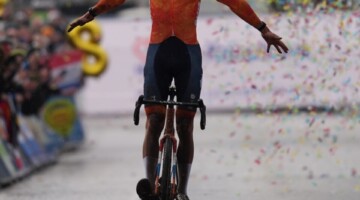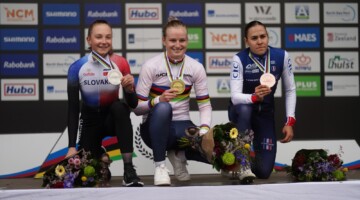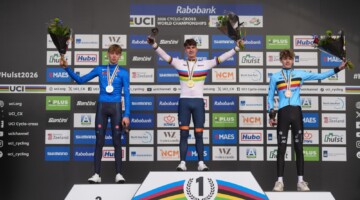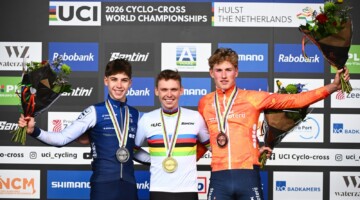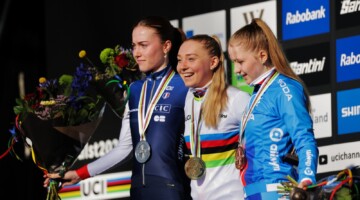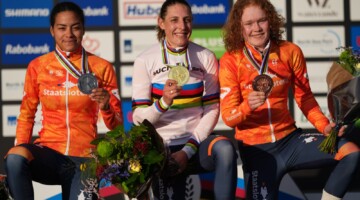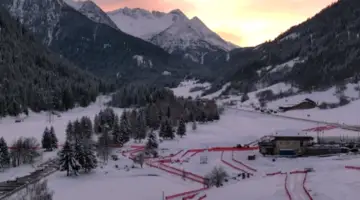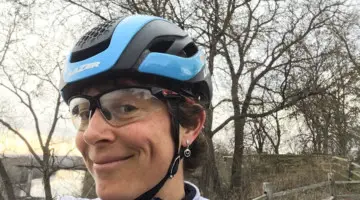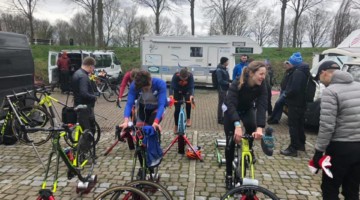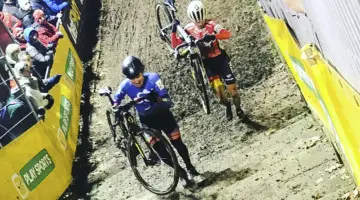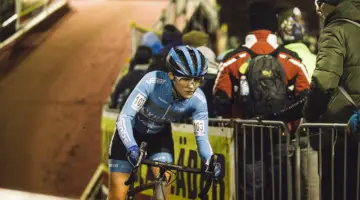Another two weeks have passed in a season that already seems to be flying by. We’re now underway in all three major series and I’m not going to lie, I’m loving the cooler temperatures in Europe and the sticky ground we have, even when the sun’s out.
The flip side of coming back to Europe early is missing amazing events like Charm City and that monster flyover they put in this year. Possibly the USA’s best venue, I’d like to see a World Cup there, just preferably in November, not during the annual early-season heat wave.
I promised more positive results last time and I’ve got that with a couple of podiums, including a third last weekend in Ronse. I loved that race; it was so hard.
Stef and I are back in Europe and back to the servants’ quarters we live in. To be fair, it doesn’t matter where you live, the first few days are just a mess with jet lag, unpacking and setting up for events. One of the big reasons for coming home early was the opportunity to ride a full Superprestige and Ijsboerke series. But sadly, despite a contract and having gotten a fairly solid fifth place in the first Superprestige, I have not been offered a Superprestige series contract.
It’s a major blow for a rider, in a number of ways. I miss a chunk of televised races (plus associated sponsorship opportunities), I miss races against the world’s best, I miss out financially in each race and the overall classification and of course potential UCI points in a season for me where every point counts.
If there is a silver lining, it has led me to use some out-of-the-box thinking, which I’m actually really excited about, including starting my first EKZ Race in Switzerland this weekend.
Overall Ranking: Eindklassement
Making Progress
From a negative to a positive, I’ll take you over to the other series, the IJsboerke Trophy. I finished third in Ronse, got some flowers, won a massive slab of gingerbread and I got to meet a couple of cyclocross heroes.
I get asked quite often who my cyclocross heroes and heroines are, and of course, folks like Hanka [Kupfernagel] are are an obvious choice. But let’s think about Jef Segers, the commercial manager of IJsboerke.
For years I’ve been campaigning, pushing, promoting women’s cyclocross in every way I can think of, but without people to back my ideas, the sport doesn’t move forward. I wrote a letter to the series operators of the DVV Series many years ago, asking for a proper overall prize fund. I got it signed by many of the world’s leading riders, and we presented it to them. They immediately said no, of course.
But miraculously the following season, there was an overall prize fund and equally as important, more riders contracted to start. It keeps improving every year and has subsequently set benchmarks for the other series.
Yes, it’s not equal, nor are women given a fastest lap prize, but without people like Jef and his backing of the series, we would be in terrible position still, and I’m hugely grateful to yet another man for backing women’s cycling and believing in us.
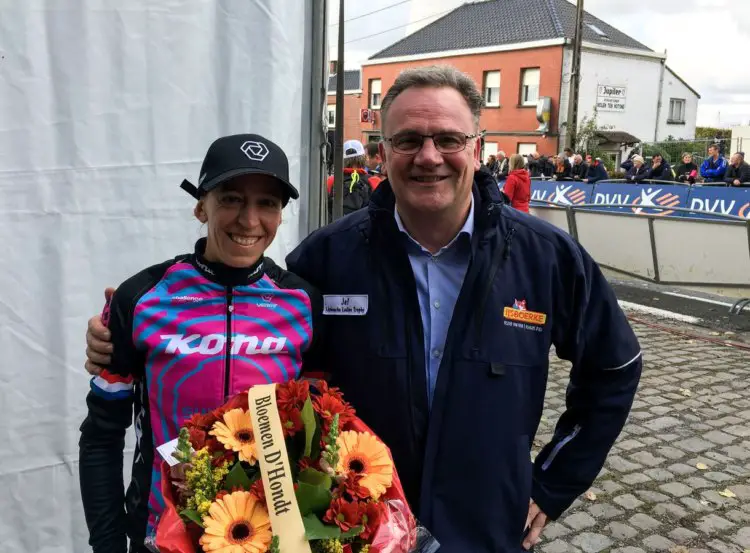
Helen is appreciative for the work Jef Segers has done with the IJsboerke series. photo: Stef Wyman
The Cost of Cyclocross
It’s well documented I’m out of contract for 2018. I’m trying to forge my own path in cyclocross as I’m determined to continue racing until my legs scream no more. I’ve been pretty open with the numbers it takes to back my program, with €10,000 being the start number for title partnership of my program for 12 months and other opportunities available from €1,500 upwards.
I often get asked why it costs what it does. So I thought I’d share some numbers from the first month of the cyclocross season for just the basic items:
- Flights – 17,000km – cost over €2000 including luggage and help
- Driving – 3,200km – Cost around €500
- Parts – Over €1,500 (Yes, us pro riders still need to invest in ourselves)
- Hotels – 6 Nights – Cost over €500
- Car Rental – €800
- Other Accommodations in Belgium – Lots per month
I’m lucky, I have people to help as volunteers, host housing in the U.S. and a husband to carry my bags and build and clean my bikes. This helps keep my costs in the last month down to between €5k and €6k.
I assure you I’m not living a grand life—far from it—and when I look at the numbers like this, it shocks me. Racing ’cross isn’t just about pinning a number on. Racing at the UCI level during my career has turned from a low-entry cost sport to one that is increasingly expensive.
The cost is hammered home good and proper when you’re facing the prospect of no monthly salary or you’re new to the sport as an up and comer. The progression away from low cost hasn’t been backed up with a growth in rider opportunity.
Volunteer – Vrijwilliger
Three Barriers to Growth
More worryingly I still see—and come up against myself—frustrating barriers in the sport every single weekend, not only in Belgium but elsewhere too. I’ll give you three examples after my next translation:
On arrival at a race: “Big Teams” can park here, everyone else has to park “somewhere else.” Generally, that means in a housing estate within a short ride from the race. Let’s put this into perspective, riders on “Big Teams” get to park close to the course, have a shorter trip to the start and, sometimes significantly, are in front of press, fans and TV cameras.
This past weekend, one rider initially got refused parking because they weren’t in a motorhome (been there myself many times), which meant they obviously aren’t an elite rider in the parking attendant and organizers’ eyes.
Just because someone can pay, or because someone has a bigger motorhome, or because someone is Belgian, doesn’t make them worthier of opportunity. Simples.
This weekend’s race was still billed with two races: “Women” and “Elite Men”. Yes, it’s 2017, just in case you forgot. Can’t women be Elite too? What’s so elite about being a man? I mean we have boobs, and that’s seen as pretty elite, right?
If you’re organizing a race, building a website or promoting a series, please, pretty please, call us Men and Women, or Elite Men and Elite Women. Simples.
My final example goes to race commentators and anyone in a position of power and influence over the social media channels that are still the home of much of the race day coverage of our sport. The men’s race isn’t necessarily “the big race” or “the one we have all be waiting for,” so please stop saying it. Women’s racing isn’t better than men’s, it’s equal; sometimes more exciting, sometimes less so. They are both races with folks trying 100% to race well, make people proud and earn a living. It’s about respect. Simples.
With that, I’m off to stretch and kill mosquitoes. Rockstar lifestyle. ‘Til next time.
Helen Wyman will be contributing bi-weekly Wyman Wednesday diaries this season.

